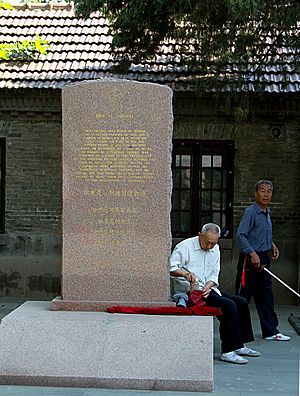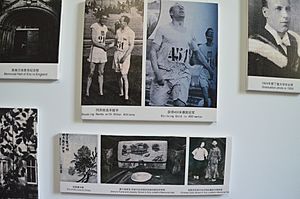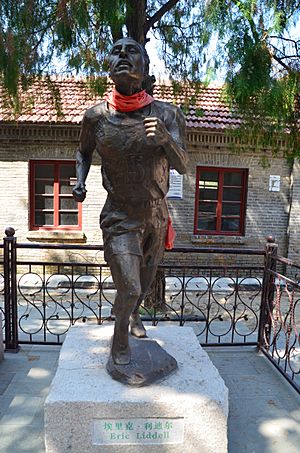Eric Liddell facts for kids
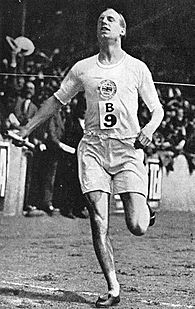
Liddell at the British Empire versus U.S.A. relays meet held at Stamford Bridge in July 1924
|
|||||||||||||||||
| Personal information | |||||||||||||||||
|---|---|---|---|---|---|---|---|---|---|---|---|---|---|---|---|---|---|
| Full name | Eric Henry Liddell | ||||||||||||||||
| Nationality | Scottish | ||||||||||||||||
| Born | 16 January 1902 Tianjin, Qing Dynasty |
||||||||||||||||
| Died | 21 February 1945 (aged 43) Weihsien Internment Camp, Shandong, Wang Jingwei Regime |
||||||||||||||||
| Spouse(s) | Florence Mackenzie | ||||||||||||||||
| Sport | |||||||||||||||||
| Country | Scotland | ||||||||||||||||
| Sport | Athletics, rugby union (7 tests) | ||||||||||||||||
| Event(s) | 100 m, 200 m, 400 m | ||||||||||||||||
| Club | University of Edinburgh | ||||||||||||||||
| Team | Great Britain | ||||||||||||||||
| Achievements and titles | |||||||||||||||||
| Olympic finals | 1924 | ||||||||||||||||
|
Medal record
|
|||||||||||||||||
Eric Henry Liddell (born 16 January 1902 – died 21 February 1945) was a famous Scottish sprinter, rugby player, and Christian missionary. He was born in Tianjin, China, to Scottish missionary parents.
Liddell is best known for his strong Christian faith. At the 1924 Summer Olympics in Paris, he refused to run in his best event, the 100 metres. This was because the race heats were held on a Sunday. Instead, he competed in the 400 metres race on a weekday, which he won.
After the Olympics, Liddell became a minister. He returned to China in 1925 to work as a missionary teacher. He stayed there until his death in a Japanese civilian internment camp in 1945. His story was made into the Oscar-winning 1981 film Chariots of Fire.
Contents
Early Life and Education
Eric Liddell was born in Tianjin, China, on 16 January 1902. His parents, James and Mrs. Dunlop Liddell, were Scottish missionaries. Eric lived in China until he was five years old.
When he was six, Eric and his older brother Robert went to Eltham College. This was a boarding school in London for the children of missionaries. Their parents and sister, Jenny, went back to China. During school holidays, the family would meet up in Edinburgh.
Becoming a Talented Athlete
At Eltham College, Eric was an amazing athlete. He won the Blackheath Cup as the best athlete in his year. By age 15, he played for the top teams in cricket and rugby. He later became captain of both teams. His headmaster said Eric was "entirely without vanity," meaning he wasn't boastful.
When he attended the University of Edinburgh, Liddell became known as the fastest runner in Scotland. Newspapers often wrote about his running achievements. Many articles suggested he could win an Olympic medal.
Eric was a very religious person. He was chosen to speak for the Glasgow Students' Evangelistic Union. They hoped his fame would attract many people to hear about Christianity. Eric would lead groups of men to share the Christian message across Scotland.
University and Rugby Career
In 1920, Liddell joined his brother Robert at the University of Edinburgh. He studied Pure Science. Sports were a big part of his university life. He ran in the 100-yard and 220-yard races for the university. He also played rugby for the University Club.
Playing for Scotland
Eric played for Edinburgh District in matches against Glasgow District. These games helped him earn a spot on the strong Scotland national rugby union team.
In 1922 and 1923, he played in seven of eight Five Nations rugby matches. He scored tries in four games, helping Scotland win against Ireland, France, and Wales. People noted his speed, but also his "rugby brains and hands." In January 2022, Eric Liddell was added to the Scottish Rugby Hall of Fame. This was 100 years after his first international game.
Setting Running Records
Liddell became the national champion in both the 110 yards and 220 yards. He won these titles at the 1923 AAA Championships. In the 100 yards, he set a British record of 9.7 seconds. This record was not broken for 23 years.
He finished his Bachelor of Science degree in 1924, after the 1924 Summer Olympics. In July 2024, the University of Edinburgh gave Liddell a special degree after his death. This was to honor his contributions to sports and humanity. His daughter, Patricia Liddell Russell, accepted the award.
The Paris Olympics
The 1924 Summer Olympics were held in Paris. Eric Liddell was a very religious Christian. He decided not to run in the 100-metre race, which was his best event. This was because the qualifying races were scheduled for a Sunday. He had known about this schedule for months.
Instead, he focused on the 400-metre race, which was on a weekday. His best time for this race before the Olympics was 49.6 seconds. This was not considered very fast by international standards.
A Special Message
On the morning of the 400-metre final, Eric received a small folded paper. It had a message: "In the old book it says: 'He that honours me I will honour.' Wishing you the best of success always." Eric recognized this as a Bible verse from 1 Samuel 2:30. He was deeply touched that someone believed in him and his decision.
The 400-metre race was usually run by starting fast and then slowing down. Eric was in the outside lane, so he couldn't see the other runners easily. Inspired by the message, he decided to sprint the entire first 200 metres. He was far ahead of the other runners, including the favored Americans. He kept sprinting around the final bend. He was challenged in the last stretch but held on to win.
Eric broke the Olympic and world records with a time of 47.6 seconds.
Other Olympic Races
A few days before, Liddell had competed in the 200-metre final. He won the bronze medal in this race. Americans Jackson Scholz and Charles Paddock won gold and silver. Eric beat his British rival and teammate Harold Abrahams, who finished sixth. This was the only time these two runners competed against each other.
His 400-metre record stood as a European record for 12 years. Another British athlete, Godfrey Brown, broke it at the Berlin Olympics in 1936.
After the Olympics
After the Olympics and graduating, Liddell continued to compete. He had missed the 4 × 400-metre relay at the Olympics because it was on a Sunday. Britain finished third in that race. Soon after the Games, Eric ran the final part of a 4 × 400-metre relay. This was in a competition between the British Empire and the USA. He helped his team win against the Americans, who had won the gold in Paris.
In 1925, at a Scottish athletics meeting, he matched his Scottish record of 10.0 seconds in the 100-yard race. He also won the 220-yard and 440-yard races. He was only the fourth athlete to win all three sprint events at this meeting. These were his last races in Britain.
Because he was born and died in China, some Chinese Olympic records list Liddell as China's first Olympic champion.
Missionary Work in China
From 1925 to 1943, Liddell returned to Northern China to work as a missionary, just like his parents. He first worked in Tianjin. Later, he moved to Xiaozhang, a very poor area that had suffered from civil wars and Japanese invasion.
While in China, Liddell still competed in sports sometimes. He won races against members of the 1928 French and Japanese Olympic teams. He also won the 1930 North China championship. He only returned to Scotland twice, in 1932 and 1939. When asked if he regretted leaving his athletic fame, Liddell said he was glad to be doing his missionary work. He felt his life counted for more in this work.
Teaching and Helping Others
Liddell's first missionary job was at the Anglo-Chinese College. This school was for wealthy Chinese students. Eric taught mathematics and science there starting in 1925. He also used his sports skills to coach boys in different games. One of his former students said Eric was very serious about protecting students' rights. He even argued with the headmaster to get more help for students from poor families.
Eric also helped build the Minyuan Stadium in Tianjin. He lived at 38 Chongqing Dao in Tianjin, where a plaque now remembers his home.
In 1932, during a break from his missionary work, he became a minister. In 1934, he married Florence Mackenzie in Tianjin. Florence's parents were also missionaries from Canada. They had three daughters: Patricia, Heather, and Maureen. Eric never met Maureen, his youngest daughter. The school where Eric taught is still used today. One of his daughters visited Tianjin in 1991 and gave the headmaster one of Eric's sports medals.
By 1941, life in China became very dangerous due to Japanese attacks. The British government told British citizens to leave. Florence, who was pregnant with Maureen, and their children went to Canada. Eric, however, accepted a job at a mission station in Xiaozhang, which helped the poor. He joined his brother, Rob, who was a doctor there. The mission needed a lot of help, and the missionaries were exhausted. Eric arrived just in time to help his sick brother. Eric faced many difficulties himself at the mission.
Life in the Internment Camp
As fighting grew between the Chinese and Japanese armies, the Japanese took over the mission station. Eric returned to Tianjin. In 1943, he was sent to the Weihsien Internment Camp in Weifang. Many other missionaries and foreign citizens were also held there.
Liddell became a leader and organizer in the camp. Food, medicine, and supplies were very scarce. When some rich businessmen secretly brought in eggs, Liddell convinced them to share with everyone. While some people in the camp were selfish, Eric focused on helping others. He helped the elderly, taught Bible classes, organized games, and taught science to the children. The children called him "Uncle Eric."
One person who was in the camp with him, Norman Cliff, wrote that Eric was "the finest Christian gentleman." He said he never heard Eric say a bad word about anyone. Another survivor, Langdon Gilkey, said Eric was "overflowing with good humour and love for life." He added that Eric was as close to a saint as anyone he had ever known.
Eric Liddell's Death
In his last letter to his wife, Eric wrote that he was suffering from exhaustion due to overwork. He had an undiagnosed brain tumor. Overwork and not enough food likely made his death happen faster. Eric Liddell died on 21 February 1945, just five months before the camp was freed.
Langdon Gilkey wrote that "The entire camp, especially its youth, was stunned for days." This shows how much Eric's death affected everyone. A fellow missionary said Eric's last words were, "It's complete surrender." This meant he had given his life fully to God. Another source says Eric was discussing a book he wrote about surrendering to God's will. He tried to say "surrender" but couldn't finish the word before he died.
Eric Liddell's Legacy
After Eric's death, a committee was formed in Glasgow in 1945. They wanted to raise money to help Eric's three daughters with their education. They also wanted to create a scholarship and a sports trophy in his name. Only the first goal, helping his daughters, and building a memorial in China were achieved.
In 2002, Eric Liddell was voted Scotland's most popular sporting hero. He was one of the first people inducted into the Scottish Sports Hall of Fame. In January 2022, he was also inducted into the Scottish Rugby Hall of Fame.
In 2008, before the Beijing Olympics, Chinese officials said Liddell had refused a chance to leave the camp. They claimed he gave his place to a pregnant woman. However, his friends and other camp survivors said this was not true.
Weifang Memorial
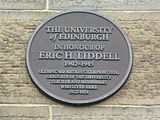
Eric Liddell was buried in the garden behind the Japanese officers' quarters. His grave was marked by a small wooden cross. The location was forgotten until 1989. It was found again on the grounds of what is now Weifang Middle School in China. Charles Walker, an engineer, worked hard to find the unmarked grave. He used a map drawn by another prisoner and stories from witnesses.
In 1991, the University of Edinburgh placed a memorial headstone at the former camp site. It is made of Isle of Mull granite. The simple message on it comes from the Book of Isaiah 40:31: "They shall mount up with wings as eagles; they shall run and not be weary." The city of Weifang honored Liddell during the 60th anniversary of the camp's liberation. They placed a wreath on his grave.
Other Honours
The Eric Liddell Centre was opened in Edinburgh in 1980. It honors Liddell's belief in helping the community. The centre aims to inspire and support people of all ages and backgrounds.
Eltham College, Eric's old school, named its sports centre the "Eric Liddell Sports Centre." In 2012, the University of Edinburgh started a sports scholarship named after Liddell. In 2023, the Eric Liddell Gym opened at the university. In 2024, a footpath on Bruntsfield Links was renamed the Eric Liddell Way.
Portrayals in Media
- The 1981 film Chariots of Fire tells the story of Liddell and fellow runner Harold Abrahams. Ian Charleson played Eric Liddell.
- In 2007, the film The Eric Liddell Story was part of The Torchlighters: Heroes of the Faith series. It showed his life as a Christian missionary.
- In 2012, a play based on the 1981 film, called Chariots of Fire, featured Jack Lowden as Liddell.
- A 2016 film, On Wings of Eagles (also known as The Last Race), starred Joseph Fiennes as Liddell. It showed his return to China and his later life after the 1924 Olympics.
Images for kids
-
Liddell at the British Empire versus U.S.A. relays meet held at Stamford Bridge in July 1924
-
Memorial plaque at Edinburgh University
See also
 In Spanish: Eric Liddell para niños
In Spanish: Eric Liddell para niños
- Protestant missions in China 1807–1953
- David Jacobs, the first British Jew to win an Olympic Gold Medal
 | Isaac Myers |
 | D. Hamilton Jackson |
 | A. Philip Randolph |


